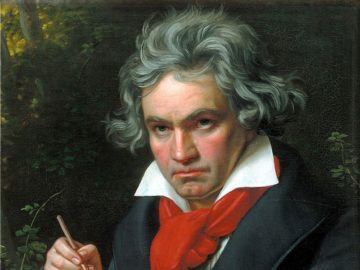Nora McGreevy in Smithsonian:
 On April 10, 1805, in honor of the Christian Holy Week, a German immigrant and conductor named Jacob Eckhard organized a special concert for the gentry of Charleston, South Carolina. The performance opened with a “grand overture” by Ludwig van Beethoven—likely the first movement of Beethoven’s First Symphony, which the composer had debuted in Europe just five years earlier. His music, characterized by great swells of emotion and technical difficulty, would have been cutting-edge for the time. “[Beethoven] wasn’t the famous composer that we think of now. He was young and upcoming, an upstart kind of person,” says Michael Broyles, a professor of musicology at Florida State University and author of the 2011 book Beethoven in America.
On April 10, 1805, in honor of the Christian Holy Week, a German immigrant and conductor named Jacob Eckhard organized a special concert for the gentry of Charleston, South Carolina. The performance opened with a “grand overture” by Ludwig van Beethoven—likely the first movement of Beethoven’s First Symphony, which the composer had debuted in Europe just five years earlier. His music, characterized by great swells of emotion and technical difficulty, would have been cutting-edge for the time. “[Beethoven] wasn’t the famous composer that we think of now. He was young and upcoming, an upstart kind of person,” says Michael Broyles, a professor of musicology at Florida State University and author of the 2011 book Beethoven in America.
Such obscurity might seem unimaginable today as the world commemorates the 250th anniversary of his birth. In truth, fervor around his music wouldn’t fully take off in the United States until after Beethoven died in 1827, and it would take major nationwide shifts in how music was consumed, and in technology and demography—not to mention the effusive praise of a few key admirers—to boost the composer’s profile in the young, rapidly growing country.
Beethoven’s music and legacy has since permeated American culture. In comics, Hollywood films, the writings of African American and feminist scholars, during wartime, and in rock’n’roll songs, Beethoven’s influence proves inescapable.
More here.
